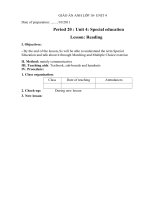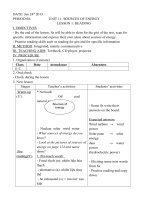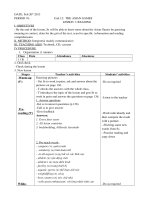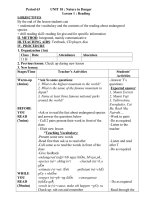giáo án anh lớp 11- unit 13
Bạn đang xem bản rút gọn của tài liệu. Xem và tải ngay bản đầy đủ của tài liệu tại đây (149.01 KB, 15 trang )
DATE: Feb 27
th
2013
PERIOD: 82 UNIT 13: HOBBIES
LESSON 1: READING
I. OBJECTIVES
- By the end of the lesson, Ss will be able to understand the passage about hobbies
+ Drill reading skills by making and aswering questions
II. METHOD: Integrated, mainly communicative
III. TEACHING AIDS: Textbook, CD, cassette, pictures, projector
IV. PROCEDURE
1. Organization (1 minute)
Class Date Attendance Absentees
11C
2. Oral check
- Check during the lesson
3. New lesson
Stages Teacher’s activities Students’ activities
Warm-
up (5’)
Pre-
reading :
(7’)
Game: Guessing pictures
- Get Ss to work in pairs, ask and
answer about the pictures on page
146.
- Checks the answers with the
whole class.
- Introduces the topic of the lesson
and gets Ss to work in pairs and
answer the questions on page 146.
- Calls on some Ss to answer the
question: “What do you like doing
in your free time?”
Lead-in (set the scene) :
You are going to read a text about
the hobbies
Pre-teach vocab
- Accomplished guitarist (n): tay
ghi ta tài hoa
- accompany (v): đi theo
- discard (v): loại bỏ
- once in a while (exp): đôi khi
- indulge in (v): đam mê
Ss work individually and then
compare the result with a
partner.
Raising birds / keeping fish /
fishing / playing chess /
swimming / playing the guitar
- Eliciting some new words from
Ss
- Practise reading and copy down
While-
reading :
(18’)
Post-
reading :
(12’)
- occupied = busy (a): bận rộn
- tune (n): giai điệu
* Checking : rub out and remember
1. Task 1.
- Ask Ss to find out the Vietnamese
equivalents to the words in Task 1
- Ask Ss to work individually and
then compare their result with a
partner.
- T checks the answers with the
whole class.
2. Task 2. Answer the questions
- T gets Ss to scan the passage and
answer the questions.
- Call on some Ss to read out the
answers and write them on the
board.
- T checks the answers with the
whole class.
- Work in groups
- Ask Ss to work in groups to ask
and answer about their hobbies.
- Work individually, and then
compare with a partner.
- Some Ss go to the board and
write the answers on the board
Expected answers:
1. tài hoa = well-trained, skilled
2. đêm đàn
3. khiêm tốn: humble
4. tham lam (= eager for)
5. vứt bỏ = throw away
6. be fascinated, enjoy
7. làm tôi bận rộn = make me
busy
- Work individually, and then
compare with a partner.
- Call on some Ss to read out the
answers and write them on the
board.
Expected answers :
1. playing the guitar
2. No, he isn’t.
3. Because he is very good at
accompanying people singing
with his guitar.
4. keeping fish
5. He bought some from the shop
and collected some from the rice
field near his house.
6. He is an avid stamp collector.
7. He collects the stamps from
discarded envelopes that his
relatives and friends give him.
8. local stamps
9. (Paragraph 4, Lines 5-7)
- Call on some Ss to act out the
conversation in front of the class.
- T checks the answers with the
whole class.
Suggested answer:
A: What is your hobby?
B: My hobby is listening to pop
music.
A: when do you often listen to
music?
B: I listen to music whenever I
have free time.
A: Which singer do you like?
B: I like listening to the songs sung
by singer My Tam. I often collect
her album and play them
everyday……
- Ask and answer questions
about each other’s hobbies
- Act out the conversation in
front of the class
- Listen to teacher’s comments
4. Consolidation (1 minute)
- Remind main points of the lesson
5. Homework (1 minute)
- Write a passage about their hobbies and prepare for the next lesson
DATE: Feb 27
th
2013
PERIOD: 83 UNIT 13: HOBBIES
LESSON 2: SPEAKING
I. OBJECTIVES
- By the end of the lesson, Ss will be able to
+ talk about a hobby and express their own ideas about collections.
+ drill speaking skills
II. METHOD: Integrated, mainly communicative
III. TEACHING AIDS: Textbook
IV. PROCEDURE
1. Organization (1’)
Class Date Attendance Absentees
11C
2. Oral check (5’)
- Answer questions about the previous reading passage
3. New lesson
Stages Teacher’s activities Students’ activities
Warm-
up (4’)
Pre-
speaking
(7’)
W hile-
speaking
: (18’)
Game : Network
- Draw a circle with “hobbies” in it on the board.
- Ask Ss to add all their hobbies around the
circle.
Collecting Stamps
Swimming
* Lead-in:
- Do you often watch TV in your free time?
- How much time do you spend on it every day?
- What’s your hobby? Why?
Today we are going to talk more about hobbies
Pre-teach vocabulary
- second-hand book stall (n): cửa hàng sách hạ
giá
- classify (v): phân loại
- exchange (v): trao đổi
- broaden (v) = widen: mở rộng
* Checking : rub out and remember
1. Work in pairs
- Ask Ss to say which of the activities on the
book (page 148) they like/not like to do and why
- Ask Ss to work in pairs to ask and answer
about the activities they like
Suggested answer:
A: Which of these activities do you like to do?
B: I like reading books and chatting with a
friend on the phone
A: Why do you like these activities?
B: I like reading books because it widens my
knowledge and chatting with friends helps me
relax and feel comfortable
Task 2. Work in pairs.
- Ask Ss to practise reading the dialogue on page
149 between Lan and Huong.
- By turns,
representative of each
group writes a right
letter on the board.
- The group with
more right letters will
win :
- Suggested answers:
- Yes.
- One or two hours
- Reading. Because it
is useful
- Eliciting from Ss
- Practise reading and
copy down
- Work in pairs
- Ask and answer
about the activities
- Ss work in pairs,
practising the dialogue
- Say the Vietnamese
equivalents
Hobbies
Playing the
guitar
Playing
computer
games
Reading
books
Post-
speaking
(8’)
- Ask some Ss to say the Vietnamese
equivalents.
- In pairs, practise the dialogue
- Move around to give help
Task 3. Work in pairs. Practise making a
dialogue.
- Ask Ss to work in pairs to ask and answer
questions about other hobbies in a free way.
- Model the conversation with a good student.
- Call on some pairs to demonstrate in front of
the class.
- Give feedback and make comments
- If there is time, ask Ss to make another
conversation
Sample conversation
A. What’s your hobby?
B. My hobby is collecting stamps.
A. How do you collect stamps?
B. I buy from the post office, ask the members of
my family, my friends, relatives and postmen I
also make pen friends with people overseas and
change stamps with others.
A. How do you organize stamps?
B. I classify stamps into categories: animals,
plants, birds, landscape, people …in album.
A. Why do you collect stamps?
B. It helps broaden my knowledge, know more
about landscape, people, animal, plants and
trees.
A. What do you plan to do next?
B. I think I will collect more stamps.
- Listen to teacher’s
feedback on
pronunciation
- Ss work in pairs to
ask and answer
questions about other
hobbies in a free way.
4. Consolidation (1’)
- Remind main points of the lesson
5. Homework (1’)
- Practise talking about their hobbies
- Prepare for Unit 13, Listening
DATE: Mar 2
nd
2013
PERIOD: 84 UNIT 13: HOBBIES
LESSON 3: LISTENING
I. OBJECTIVES
- By the end of the lesson, Ss will be able to
+ know more about hobbies.
+ listen for general information
+ drill listening skills through doing T/F questions and filling in the missing words
II. METHOD: Integrated, mainly communicative
III. TEACHING AIDS: Textbook, CD, cassette
IV. PROCEDURE
1. Organization (1 min)
Class Date Attendance Absentees
11C
2. Oral check (5 mins)
- In pairs, ask and answer questions about each other’s hobbies
3. New lesson
Stages Teacher’s activities Students’ activities
Warm-up
(5 mins)
Pre-
listening (6
mins)
Game : Brainstorm
- Divide the class into 4 groups.
- Tell Ss to write at least 3 benefits of
reading books.
- Ask representatives of the groups write
on the board.
- The group with more right benefits
will win.
Pre-teach vocabulary:
- Catch a disease (v): mắc bệnh
- go deep into (v): đi sâu vào …
- cope with (v): đương đầu với
- gigantic (a): khổng lồ
- bygone (n): quá khứ
* Checking : What and where
- Each group tries to
write at least 3 benefits
of reading books.
- Representatives of the
groups write on the
board.
- help broaden
knowledge
- know more
information
- strengthen writing
ability
- help in daily life
- help relaxing, less
stressful
- learn more good things
- Elicit new words from
Ss
- Practise reading and
While-
listening
(18 mins)
Post-
listening (8
mins)
* Listen and repeat (p.150)
Today we will learn about some benefits
of reading books. Listen and do the
tasks that follow.
1. Task 1
- Before listening, Ss read Task 1
carefully and guess the answers, and T
writes their answers on the board.
- Play the CD 2 times and gets Ss to
work in pairs to choose the best answer
A, B, C, or D
- Invite some Ss to give the answers.
- Check the answers with the whole
class.
- Play the CD one more time for Ss to
listen and check if necessary.
Suggested answers:
1. T 2. F 3. F 4. T 5.
F 6. T 7. T 8. T
2. Task 2.
- Ask Ss to read the questions carefully
before they listen to the recording again.
- Have Ss compare the results with a
partner.
- Call on some Ss to write their answers
on the board.
- T and Ss check
Suggested answer:
1. wonderful
2. disease
3. jungle
4. certainly
5. ignorantly
- Call some Ss to talk about the
disadvantages of over-reading.
- Give feedback.
copy down
- Some Ss rewrite the
English words.
- Ss work in pairs to
guess the options
- Some Ss make
prediction and T writes
their predictions on the
board.
- Ss listen and check
their prediction.
- Ss listen for the second
time
- Some Ss call out their
answers and T writes
them on the board.
- Work individually and
then compare the results
with a partner.
Suggested answers:
- have no time for study/social activities
- spend a lot of money
- easy to be short-sighted
- become lazy
- Talk about the
disadvantages of over-
reading
- Listen to teacher’s
feedback
4. Consolidation (1 min)
- Remind main points of the lesson
5. Homework (1 min)
- Talk about the advantages and disadvantages of over-reading
- Prepare for Unit 13, Writing
DATE: Mar 3
rd
2013
PERIOD 85: UNIT 13: HOBBIES
LESSON 4: WRITING
I.OBJECTIVES By the end of the lesson, Ss will be able to
+ write about a collection, real or imaginary and describe their collection.
+ widen their vocab. about hobby, especially about a collection
+drill ss’ writing skill: write a collection
II. METHOD: Integrated, mainly communicative
III. TEACHING AIDS: Textbook, sample writing
IV. PROCEDURE
1. Organization (1 min)
Class Date Attendance Absentees
11B
2. Oral check (5 mins)
- Answer teacher’s questions about the previous listening passage
3. New lesson
Stages/Time Teacher’ activities Students’ activities
Warm-up
(4 mins)
Pre-writing
(10 mins)
Game : What and Where
(about some words in the previous
lesson)
- Ask Ss to listen and repeat those
words and erase them word by word
Lead-in: Today we are going to write
a paragraph about a collection.
- Get students to read task1(p.151)
silently and answer the questions that
follow
-Ask students to talk about things that
they like about collections using :
1. name of your collection
2. how you to collect them
3. how you keep them
4. when you started your collection
5. how you classify them
- Eliciting from Ss
- Ss listen and repeat those
words
- Some Ss go to the board
and rewrite the erased words.
- Read task 1
- Talk about things that you
like about your collections
Suggested information:
1. collecting books
2. buy interesting books from
bookshop and some others
from second-hand book
stalls.
While-
writing
(15 mins)
6. why you collect them
7. your plan for the future
- Go around the class and give help
when needed.
- T corrects Ss’ mistakes if needed
- Ask Ss to work individually to write
a paragraph describing their
collections
- Go around and give help if necessary
- Ask them to work in pairs to correct
mistakes
Sample writing:
My collection is collecting
books. I do it regularly. Whenever I
find an interesting book, I buy it
immediately. I buy books from
bookshop and some others from
second-hand book stalls. Sometimes
my parents give me some books they
find interesting. I keep them carefully
on bookshelves. When I was a child,
my parents often bought a lot of books
for me to read, so my interest in
reading developed very early, and I
began to collect books from my
childhood. I classify books into
categories: science books, picture
3. keep them on bookshelves
4. from childhood
5. classify them into
categories: science books,
picture books, story books,
novels, animals, famous
people …
6. I believe they are useful,
interesting, relaxing …
7. I think I will continue
making my collection richer
and richer
Ss work individually
- Write a paragraph
describing your collections
- Ask T questions if you need
help
- Work in pairs to correct
your partner’s mistakes
Post-
writing
(12’)
books, story books, novels, animals,
famous people …I like to collect
books because I think they are useful,
interesting, relaxing… People say that
books are human beings’ treasure of
knowledge. I think it is a good habit;
therefore I will continue making my
collection richer and richer
- Ask Ss to write their description on
the board.
- Get Ss to make peer corrections
.
- T corrects Ss’ mistakes if needed
- Some Ss copy their writing
on the board.
- Listen to peer and teacher’s
correction
4. Consolidation (1 min)
- Remind main points of the lesson
5. Homework (1 min)
- Ask student rewrite the collection on notebooks
- Prepare for Unit 13, Language focus
DATE: Mar 4
th
2013
PERIOD: 86 UNIT 13: HOBBIES
LESSON 5: LANGUAGE FOCUS
I. OBJECTIVES
- By the end of the lesson, Ss will be able to
+ distinguish the sounds / pt / - / pd / - / ps / - / bz / by saying them correctly when
saying individual words as well as sentences
+ understand and know how to use cleft sentences by doing some more exercises
+ drill Ss’ main skills
II. METHOD: Integrated, mainly communicative
III. TEACHING AIDS: Textbook, CD player, disc
IV. PROCEDURE
1. Organization (1 minute)
Class Date Attendance Absentees
11B
2. Oral check
- Check during the lesson
3. New lesson
Stages/Time Teacher’s activities Students’ activities
Warm-up
(4’)
Pronunciatio
n : (5’)
Grammar
(30’)
-Provide ss some words
Stop stopped stops
Rob robbed robs
-Ask ss to pronounce these words
-Call some ss to read aloud
-Give feedback
-Introduce new lesson
* Listen and repeat (p.151)
-T models the 4 clusters / pt / - / bd / - / ps / -
/pz/
- Ask Ss to listen to the disc then read after the
disc
-Play the disc 2 times
-Ask ss to read the words in each column out
loud in chorus for a few times. Then call on
some Ss to read the words out loud.
* Practise reading these sentences
- Read the sentences and ask Ss to underline the
words that contain the sound / pt / - / bd/ - / ps /
- /pz/
- Ask Ss to read sentences again
- Give comments on Ss’ pronunciation
I. Theory: Cleft sentences
Ex: Nam bought an interesting book in Hanoi
last week.
S O adverbial
modifier
Different parts of the sentence can be
emphasized in this way:
- It was Nam who bought an interesting book in
Hanoi last week. (Subject focus)
- It was an interesting book that Nam bought in
Hanoi last week . (object focus)
- It was in Hanoi that Nam bought an
interesting book last week (adverbial focus)
- It was last week that Nam bought an
interesting book in Hanoi(adverbial focus)
-Give the form
It + be + focus + clause
(This is called a CLEFT SENTENCE because
the original sentence has been divided (or
"cleft") into two clauses)
-Pronounce the words
-Read the words
aloud
-Listen to the teacher
- Listen to the
teacher
-Listen to the disc the
repeat in chorus
- Practise reading
aloud the sentences
given on page 151.
- Listen to teacher’s
comments
- Work in pairs to
define the function of
the underlined words
- Take notes
a,It + be + Noun (phrase) + who/that + V
(Subject focus)
b,It + be + Noun (phrase) + who(m)/that + S
+V(object focus)
c,It + be + adverb + that + S + V(adverbial
focus)
II. Practice
Exercise 1.
- Ask Ss to work in pairs to study the example
then do the exercise
-Call ss to write the answers on the board
-Check and give feedback
Suggested answer:
1. It was the boy who visited his uncle last
month.
2. It was my mother who bought me a present on
my birthday
3. It was Huong and Sandra who sang together
at the party
4. It was Nam’s father who got angry with him
5. It was the boy who played football all day
long.
6. It was the girl who received a letter from her
friend yesterday.
7. It was his presence at the meeting that
frightened the class
Exercise 2:
- Ask Ss to work in pairs to study the example
then do the exercise
-Call ss to write the answers on the board
-Check and give feedback
Suggested answer:
1- It is English that the man is learning.
2. It was the book that the woman gave him.
3. It was the postcard that she sent her friend.
4. It was the book that Hoa borrowed from Long
5. The little boy greeted his grandfather in a
strange language.
6. It was his father whom the little boy greeted
in strange language
- Work in pairs to
study the example
then do the exercise
- Present the answer
on the board
Take notes
- Work in pairs to
study the example
then do the exercise
- Present the answer
on the board
Take notes
- Work in individuals
then compare the
answer with a friend.
-Do as required
-Take notes
Exercise 3.
- Ask Ss to work in pairs to study the example
then do the exercise
-Call ss to write the answers on the board
-Check and give feedback
Suggested answer:
1. It was in the garden that the boy hit the dog
2. It was for tea that she made cakes
3. It was for him that his father repaired the
bicycle
4. It was on his birthday that she presented him
a book
5. It was in Britain that he met his wife
6. It was from the shop that she bought that
present
7. It was at 8.00 a.m that the meeting started
Further practice:
-Give ss hand-outs
-Ask ss to do exercises there
-Call ss to give answers
-Check and give feedback
Answers;
Ex1.
1. A 2. D 3. C 4. D 5. C
Ex2.
1. C 2. B 3. C 4. A 5. B
-Do the exercise
-Give the answers
-Take notes
4. Consolidation (1 minute)
- Remind main points of the lesson
5. Homework (1 minute)
- Ask student rewrite the collection on notebooks and prepare for Test yourself E
Hand-outs in part Further Practice
Exercise 1: Choose the best answer
1…….I bought the golden fish
A. It was from this shop that B. It was from this shop where
C. It was this shop which C. It was this shop that
2. It was Tom……… to help us
A. comes B. that comes C. to come D. who came
3………the police had rescued from the fire
A. The baby B. The baby that C. It was the baby whom D. The
baby whom
4. …… my parents gave me the fish tank
A. It was on my birthday when B. It was my birthday on that
C. It was my birthday that D. It was on my birthday that
5. … a high level of blood cholesterol
A. It is eggs that contain B. Those are eggs it contains
C. It is eggs that contains D. It is eggs contain
Exercise 2: Circle the underlined part that needs correcting
1. It was at this shop where I bought a T-shirt three days ago
A B C D
2. It was Christine whose fans gave lots of flowers
A B C D
3. It is his mother whom is on the phone
A B C D
4. It was 1966 that England won the World Cup
A B C D
5. It was an English book which Nam gave me yesterday
A B C D









